
What’s the best thing about being young? Wrinkle-free skin is often cited. So is a fast metabolism, limited responsibilities and the student diet. But, traditionally, one major perk of being a young adult is the permission to drink heavily, sometimes even daily, without being branded as an alcoholic.
Which is why new statistics suggesting 27 per cent of 16-24 year olds live a teetotal lifestyle prove so surprising.
Can it be true? Are bright young things sacrificing the hedonism of youth in order to run faster on the treadmill? Is conservative generation Y so square as to shun the pleasures of Jack and Jim in favour of a clear head – and conscience – the next morning? Surely not. As a 23-year-old myself, living in London (where the number of young teetotallers rises to a third) I can count my non-drinker friends on one hand. And yet, if the statistics are to be believed, that’s exactly what’s happening.
Nor do these figures exist in isolation. Last March, Redemption, a pop-up sober bar based around London, announced that they had received investment to open up a permanent location.
At the start of the year, Carlsberg UK launched San Miguel 0.0%, an alcohol-free beer, while alcohol-free wine market leader Eisberg launched its “A Wine to Remember” advertising campaign in the same month.
The popularity of campaigns like Dry January and Sober October, which encourage people to take a month off alcohol, is indicative of a growing willingness to try a sober lifestyle.
Young, gifted and sober
Young celebrity teetotalers such as Fearne Cotton, Leona Lewis and Daniel Radcliffe have gone public about their choice not to drink. “It was unhealthy and damaging to my body and social life”, Radcliffe said of his choice to abstain from alcohol following issues with drinking.
However, these celebrities remain anomalies, with even Radcliffe, having abstained for personal reasons, admitting that he “would love to be a person that goes to parties and has a couple of drinks and has a nice time.”
Some credit a renewed interest in wellness for the trend: “The face of youth is changing as Millennials become more aware of their health longevity. Fitness and health are being rebranded in hip and sociable ways,” according to a 2015 trend report from J. Walter Thomson Intelligence.
Virgin cocktail, anyone?
Meryn Fell, 22, a primary school teacher with an interest in bodybuilding, gave up alcohol a year ago in order to help her with her fitness goals. “I feel much healthier physically and mentally. Drinking alcohol only heightened my poor body image, making me feel unhealthy and paranoid,” says Meryn.
Livvy Wells, 24, a student at the London College of Fashion, says: “It was giving me anxiety and affecting my general health so I didn’t see the point in continuing drinking.”
For others, it’s a personal choice. Adam Wood, 23, who works for a London-based PR firm, has not had more than a sip of alcohol his whole life. “It was a personal decision when I was nine,” he says, “I’m very stubborn.”
Teetotal may not be as trendy as we think
Despite not drinking themselves, none of the people I spoke to have met many like-minded counterparts. Livvy considers drinking “an integral part of British nights out,” and hasn’t noticed anyone her age choosing to banish the booze. Nor has Meryn.
Adam has only ever met one person who was teetotal for personal reasons – but some of his Muslim friends have never drunk. So if teetotalism is a lifestyle trend, it is not an easy one to spot.
Religious reasons, rather than the influence of a trend, are likely to account for some of these teetotal youngsters. Considering that 5 per cent of the UK identify as belonging to Islam, a religion which forbids alcohol, and 88 per cent of UK Muslims are under 50, it is likely that that this religion alone accounts for a sizeable proportion of the one in five non-drinkers in Britain.
“Whilst the average level of consumption has fallen, this may be in part due to the change in the ethnic make-up of the country with many people abstaining from drinking altogether,” adds Professor Sir Ian Gilmore, chairman of the Alcohol Health Alliance UK.
Gilmore also draws attention to the unreliability of self-reported alcohol consumption data – something that many young people, myself included, might relate to. During my Freshers year, in 2011, I recall a number of my friends lying on an NHS form about alcohol consumption (“Don’t tell the truth,” one man told me, “I did – and the results told me I was an alcoholic…”)
Is the alcohol industry on its last legs?
Part of me wants to believe that this is part of a rising trend – but the London nightlife scene calls bullshit. Friday evenings spent getting drunk at the pub is the raison d’être among my university crowd, and we’re not the only ones. Alcohol is omnipresent in every area of life as a young person: social media, university culture, nightlife, and even the onset of “all you can drink” brunches among the city glitterati.
Nor are the remaining millennial drinkers, however modest or otherwise their numbers might be, taking much inspiration from their saintly counterparts. The most recent statistics, published in the Emergency Medicine Journal, show that 14 per cent of Accident and Emergency visits are linked to alcohol – and the figure has doubled in the last decade.
It’s not all binge drinking and ill health, however. Alcohol, drunk in moderation, is for many an enjoyable aspect of British culture, enjoyed during after work drinks or hearty Sunday lunches at the pub.
There is no doubt that some millennials have discovered the benefits of a sober lifestyle – even if this isn’t apparent from nightclub dancefloors. But, whatever the statistics say, it might be a while until most young people are prepared to ditch their favourite social lubricant. And I’ll raise a glass to that.






















